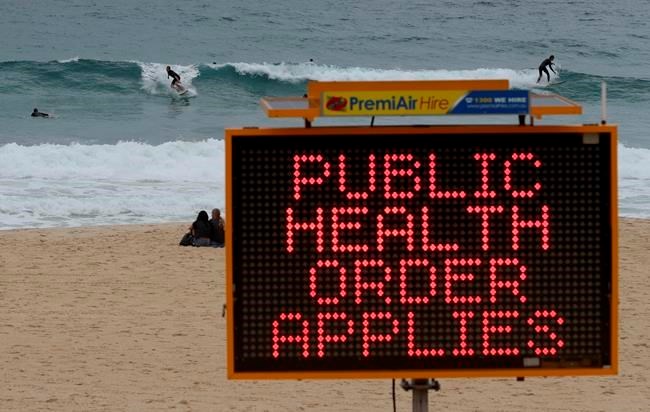SYDNEY, Australia — Sydney’s northern beaches will enter a lockdown similar to the one imposed during the start of the COVID-19 pandemic in March as a cluster of cases in the area increased to 41.
From late Saturday afternoon until midnight Wednesday, residents will only be permitted to leave their homes for five basic reasons: medical care, exercise, grocery shop, work or for compassionate care reasons.
An additional 23 cases were recorded in the 24 hours, including 10 already announced, taking the new cases to 41. All but two of those are from the so-called Avalon cluster, named after a community of about 10,000 people on the northern beaches about 40
New South Wales state Premier Gladys Berejiklian says the restrictions are essential if Sydney has any hope of a semi-normal Christmas.
“We’re hoping that will give us sufficient time to get on top of the virus, so that we can then ease up for Christmas and the New Year,” she said.
The new cases came as health officials asked hundreds of gym goers on Sydney’s northern beaches to get tested and isolate immediately. The gym adds to a lengthy list of venues, including a lawn bowling club, visited by confirmed cases published by authorities on Friday.
Other states acted to prevent the cases jumping borders, with more barriers for New South Wales residents put in place by Western Australia, Victoria, Queensland, Tasmania and the Northern Territory. Most of those involved 14-day quarantine periods for people from the northern beaches who travel to those states.
Elsewhere in the Asia-Pacific region:
— Thailand has reported more than 500 new coronavirus cases, the country’s highest daily tally. The 548 new cases, most of them connected with an outbreak at a wholesale seafood market on the outskirts of Bangkok, come after the country saw only a small number of infections over the past several months due to strict border and quarantine controls. Health officials said 516 of the new cases were found in connection with the outbreak at the Klang Koong shrimp market in Samut Sakhon province. The first case at the market was confirmed on Thursday, followed by 13 more on Friday. Samut Sakhon Gov. Veerasak Vichitsangsri said late Saturday that strict measures, including a 10 p.m.-5 a.m. curfew, will be taken in the province to combat the outbreak. The restrictions will be in effect until Jan. 3.
— Long lines snaked around coronavirus testing sites in the South Korean capital of Seoul, as the country reported another 1,053 cases, the fourth straight day of over 1,000. The viral resurgence has raised questions about the government's handling of the outbreak. Authorities are still deciding whether to increase social distancing to maximum levels, fearing it may further strain the economy. The numbers released by the Korea Disease Control and Prevention Agency on Saturday brought the national caseload to 48,570, with nearly 7,000 cases added over the past week alone. Fourteen COVID-19 patients died in the past 24 hours to bring the death toll to 659. There are concerns that fatalities will continue to rise because of a shortage of intensive care beds in the hardest-hit Seoul metropolitan area. The KDCA said at least 275 among 13,577 active patients are in serious or critical condition, the most since the emergence of the pandemic. Officials say at least six have died at their homes or long-term care facilities because hospitals ran out of beds. Thousands of people have been lining up at testing
— India’s coronavirus cases have crossed 10 million with new infections dipping to their lowest levels in three months, as the country prepares for a massive COVID-19 vaccination in the new year. Additional cases in the past 24 hours dropped to 25,152 from a peak of nearly 100,000 in mid-September. The epidemic has infected nearly 1% of India’s more than 1.3 billion people, second to the worst-hit United States. A government health expert says India is keeping its fingers crossed as the cases tend to increase in winter months. India is home to some of the world’s biggest vaccine-makers and there are five vaccine candidates under different phases of trial in the country. India aims to provide vaccines to 250 million people by July 2021.
— China says it will soon begin coronavirus inoculations for workers in health care, transport and border control. The vice minister of the National Health Commission says the government is prioritizing those most at risk. Workers in logistics and in markets selling fresh meat and seafood would also be placed higher on the list of those receiving vaccines, along with the elderly and those with underlying medical conditions. Vaccines produced by Chinese companies are now pending approval in Turkey, Indonesia and Brazil, as manufacturers continue testing the vaccines in more than a dozen countries including Russia, Egypt and Mexico. The United Arab Emirates last week announced the vaccine was 86% effective in the first public release of such information. Even before final market approval, more than a million people have received vaccine shots in a program critics say has not been transparent about safety, efficacy or scientific merit.
___
Follow AP’s coverage at https://apnews.com/hub/coronavirus-pandemic and https://apnews.com/UnderstandingtheOutbreak
The Associated Press



